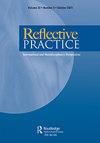Using design thinking to explore teaching problems in Chilean schools
IF 1.6
Q2 EDUCATION & EDUCATIONAL RESEARCH
引用次数: 0
Abstract
ABSTRACTEducational systems face increasingly complex demands, confronting teachers with multidimensional people-centred problems rarely solved by linear or standardised solutions. Nevertheless, teachers must juggle multiple variables simultaneously in their daily work. This can lead to routine and unreflective decisions that do not consider unique situations. Considering that designers’ abductive reasoning could support problem-framing skills, this article discusses how a design thinking approach can contribute to developing reflective teaching practice. This case study explores how 20 Chilean teachers define, frame, and re-frame their pedagogical problems in a design-based teacher professional development programme. Findings revealed three problem-framing triggers that support teachers’ reflection: (a) collaborative discussions, (b) awareness of people and their context, and (c) visualising, making, and testing ideas. Combined, they articulate action and promote reflection, demonstrating the value of a design thinking approach in supporting teachers’ pedagogical decisions.KEYWORDS: Reflective processreflective teachingproblem framing and reframingdesign thinkingChilean teachers Disclosure statementNo potential conflict of interest was reported by the author(s).Notes1. According to Simon (Citation1996), all professionals ‘design’ when carrying out actions to change existing situations into preferred ones. Drawing on Simon, Schön (Schön, Citation1998) argues that the concept of design has expanded from architecture, urbanism, engineering and product design to other professions also concerned with changing a current situation into preferred, future and imagined ones.2. The Hasso Plattner Institute of Design at Stanford University.Additional informationFundingThis work was supported by the British Council and Universidad del Desarrollo under grant Newton-Picarte Institutional Skills ISCL22015002.Notes on contributorsÚrsula BravoÚrsula Bravo is an Associate Professor at the Design School of Universidad del Desarrollo in Chile. She has extensive experience teaching design methods in Design and Teaching undergraduate and graduate programmes. She has been a grantee from the Chilean National Research and Development Agency (ANID). She has led projects funded by the British Council, the Ministry of Education and the Ministry of Cultures, Arts and Heritage. She is a member of the Design Research Society and the Design Literacy International Network cofounder. She is the Editor-in-Chief of Base Diseño e Innovación, open access journal.Catalina CortésCatalina Cortés is a professor at the Design School of Universidad del Desarrollo in Chile. She has received national and international funds to enhance knowledge in various design-related areas. These include design literacy for transdisciplinary collaboration, emergent spatial design thinking processes, design thinking for problem-solving in school education, and sustainable packaging design. Additionally, she holds a patent for a mathematics learning technology. Catalina is certified by The Index Project in Denmark and is an active member of the Design Research Society’s IAC.Peter LloydPeter Lloyd is a Professor of Integrated Design Methodology in the Faculty of Industrial Design Engineering at the Technical University of Delft. He teaches design methods, design thinking, AI and design, and design ethics, and his research looks at all aspects of the design process with a focus on language. He is the Editor-in-Chief of the Journal Design Studies, the former Chair of the Design Research Society, and Vice President of IASDR (International Association for Societies of Design Research). He was previously a Professor of Design Studies at The Open University, UK and a Professor of Design at the University of Brighton, UK.Derek JonesDerek Jones is a Senior Lecturer in Design at The Open University (UK) and part of the OU Design Group. Derek is the Convenor of the Design Research Society’s Education special interest group (EdSIG) and a qualified architect with 15 years of experience in the construction design and procurement industries. He is a co-lead for the new design degree and has developed online learning technologies in design education. His main research interests are: the pedagogy of design and creativity, embodied cognition in physical and virtual environments, and theories of design knowledge.运用设计思维探讨智利学校的教学问题
教育系统面临着越来越复杂的需求,教师面临着以人为本的多维问题,很少能通过线性或标准化的解决方案来解决。然而,教师必须在日常工作中同时处理多个变量。这可能导致不考虑特殊情况的常规和不经思考的决定。考虑到设计师的溯因推理可以支持问题框架技能,本文讨论了设计思维方法如何有助于发展反思性教学实践。本案例研究探讨了20名智利教师如何在一个基于设计的教师专业发展项目中定义、构建和重新构建他们的教学问题。研究结果揭示了支持教师反思的三种问题框架触发因素:(a)合作讨论,(b)对人和他们的背景的认识,以及(c)可视化,提出和测试想法。结合起来,它们阐明了行动并促进了反思,展示了设计思维方法在支持教师教学决策方面的价值。关键词:反思性过程反思性教学问题框架与重构设计思维智利教师披露声明作者未报告潜在利益冲突。根据Simon (Citation1996)的说法,所有专业人士在执行行动时都会“设计”,将现有情况改变为首选情况。参考Simon, Schön (Schön, Citation1998)认为,设计的概念已经从建筑、城市规划、工程和产品设计扩展到其他专业,这些专业也涉及将当前的情况转变为首选的、未来的和想象的情况。斯坦福大学哈索·普拉特纳设计学院。本研究由英国文化协会和德萨罗罗大学资助,Newton-Picarte机构技能ISCL22015002。contributorsÚrsula BravoÚrsula布拉沃是智利德萨罗罗大学设计学院副教授。她在设计与教学本科和研究生课程中拥有丰富的设计方法教学经验。她是智利国家研究与发展署(ANID)的受助人。她领导了由英国文化协会、教育部和文化、艺术和遗产部资助的项目。她是设计研究学会的成员和设计素养国际网络的联合创始人。她是开放获取期刊Base Diseño e Innovación的主编。卡塔琳娜·科特萨梅斯是智利德萨罗罗大学设计学院的教授。她获得了国家和国际基金,以提高在各个设计相关领域的知识。其中包括跨学科合作的设计素养,紧急空间设计思维过程,学校教育中解决问题的设计思维,以及可持续包装设计。此外,她还拥有一项数学学习技术的专利。卡塔琳娜获得了丹麦Index项目的认证,并且是设计研究协会IAC的活跃成员。Peter Lloyd是代尔夫特工业大学工业设计工程学院综合设计方法论教授。他教授设计方法、设计思维、人工智能与设计以及设计伦理,他的研究着眼于设计过程的各个方面,重点是语言。他是《设计研究》杂志的主编,前设计研究学会主席,国际设计研究学会协会副主席。他曾任英国开放大学设计研究教授和英国布莱顿大学设计教授。Derek Jones是开放大学(英国)设计高级讲师,也是开放大学设计组的一员。Derek是设计研究学会教育特别兴趣小组(EdSIG)的召集人,也是一名在建筑设计和采购行业拥有15年经验的合格建筑师。他是新设计学位的联合负责人,并开发了设计教育的在线学习技术。主要研究方向为:设计与创意教育学、物理与虚拟环境中的具身认知、设计知识理论。
本文章由计算机程序翻译,如有差异,请以英文原文为准。
求助全文
约1分钟内获得全文
求助全文

 求助内容:
求助内容: 应助结果提醒方式:
应助结果提醒方式:


